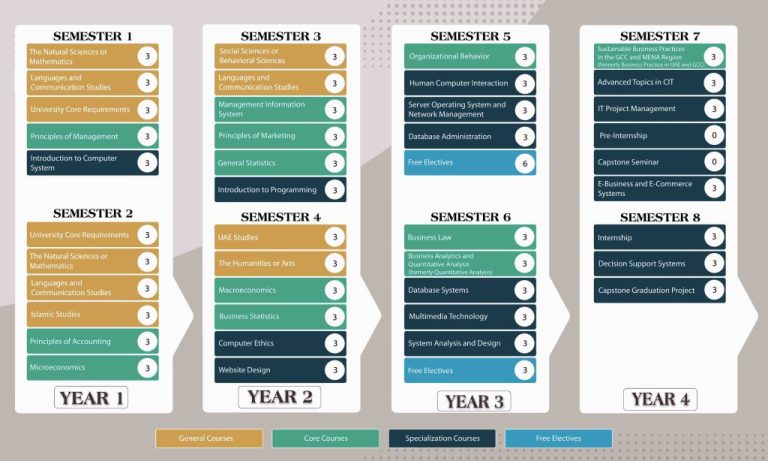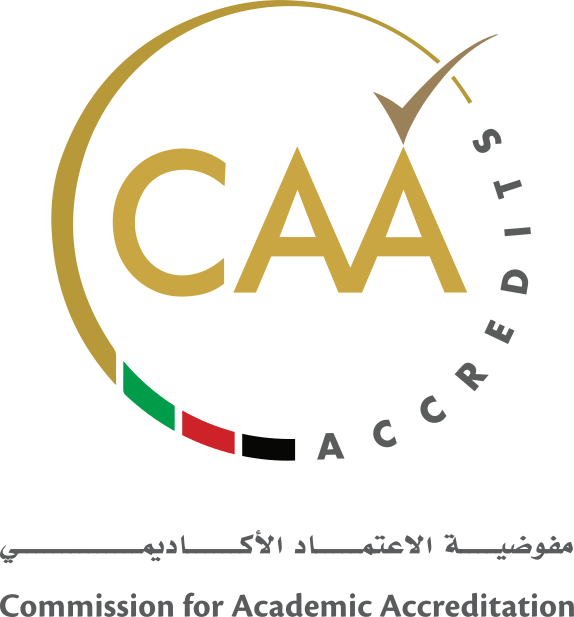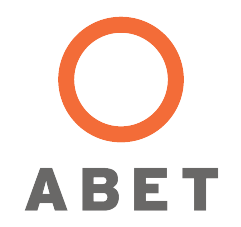
- Overview
- Program Structure
- Accreditations
- Faculty
- Admission
-
Duration
4 Years
-
Classes
Weekday Weekend
-
Fees
Tuition (One Semester) ……… Approx. 21,000 AED
One academic year is two semesters
Admission (One Time) ……… 3,150 AED
About Program
Embrace the digital revolution and become a leader in the technology-driven world with our Bachelor of Science in Information Technology Management program. Gain a comprehensive understanding of IT systems, network infrastructure, cybersecurity, database management and project management. Learn to harness the power of technology to drive business innovation, streamline operations and optimize performance. With the increasing demand for IT professionals across industries, this program opens the doors to a wide range of careers, such as IT project manager, systems analyst, cybersecurity specialist and IT consultant. Enroll today and become a catalyst for digital transformation.
Program Goals
- Analyze a complex computing problem and to apply principles of computing and other relevant disciplines to identify solutions.
- Design, implement, and evaluate a computing-based solution to meet a given set of computing requirements in the context of the program’s discipline.
- Communicate effectively in a variety of professional contexts.
- Recognize professional responsibilities and make informed judgments in computing practice based on legal and ethical principles.
- Function effectively as a member or leader of a team engaged in activities appropriate to the program’s discipline.
- Support the delivery, use, and management of information systems within an information systems environment. [IS].
Program Learning Outcomes
Demonstrate IT and Management concepts, techniques, skills, and tools.
Identify professional, security, ethical and social issues in IT and Management processes.
Effectively communicate knowledge and concepts in teams to achieve desirable goals.
Design computer programs or processes to meet business needs.
Contribute to professional knowledge and field of practice of information technology.
Preparatory Courses
Prior to their enrollment in the program, students applying for Bachelor of Science in Information Technology Management must sit for the placement test related to the program, failure to successfully passing the placement test, they are required to enroll in the following courses :
#
1
2
3
Course Code
CIT 90
MAT 90
ENG 99
Courses
Computer Preparatory
Mathematics Preparatory
Academic Writing (*)
Credit Hours
0
0
0
Exemption Condition
Passing the Placement Test
Passing the Placement Test
Passing the Placement Test
(*) Students must pass the English Proficiency.
Program Structure
Course Category
General Education Courses
Core Courses - Business
Core Courses - IT
Free Electives
Total
Total Number of Courses
11
12
18
3
44 Courses
Total Number of Credit Hours
33
36
48
9
126 Credit Hours
- General Education Courses
- Core Courses – Business
- Core Courses – IT
- Free Electives
A: University Core Requirements
The student selects 6 credit hours (2 courses) from the list below:
The purpose of this course is to facilitate the process of transition into new academic and cultural environment for the new students enrolled in the AUE. Furthermore, it aims to promote their confidence so that they could succeed and meet the academic requirements. The course assimilates academic content with interactive in class activities to ensure understanding of curricular options and begin to develop a future career plan through self-reflection.
Innovation is the engine of opportunity and, acting as a catalyst, this course is intended to ignite an interest in innovation and inspire entrepreneurial action. At the core of innovation and entrepreneurship is a commitment to experiential learning that will encourage students to engage in critical thinking, creative problem-solving while also equipping them with the soft skills needed in their pursuit of academic and professional endeavors. Students will discuss the relevance and role of innovation and entrepreneurship in work and life situations; determine opportunities for creative disruption and design a strategy for its implementation; develop a practical understanding of innovation through thoughtful debate and exercises; and demonstrate critical thinking and individual insight with a personal mastery portfolio.
B: Languages and Communication Studies
The student must select 9 credit hours (3 courses) from the list below.
Students must take all of the following courses:
This course provides students with advanced writing skills in English so that they can successfully pursue their studies in various academic specializations. It helps students to develop, improve, and upgrade their writing and structure skills, and it also acquaints students with technical writing, research papers, and essays since brief research methods are applied in student projects and assignments.
Students must take one of the following Arabic Language courses:
This course is designed to enable the Arabic-speaking student with the necessary language skills, especially focusing on the steps of writing reports, official letters and systematic research.
To achieve this, and to develop the student’s abilities to understand correctly what he reads and listens, and to gain the ability to write articles, reports, meeting minutes and recommendations of conferences and seminars in a sound manner, the course was concerned with training the student in basic writing skills; such as multiple spelling rules, punctuation marks, paragraph system, and essay writing progressively.
This course is based on the principle that “Education” is an accumulative task especially when it comes to language learning. This process undergoes specific stages to assist the non-Arabic speakers to reach the ultimate goal which is to acquire the required skills (listening, speaking, reading, writing) easily and accurately. To achieve this aim, text-based dialogues are provided as head start for the non-Arabic speakers to continue to the higher levels. The course also provides basic elements for reading, writing, dialogues, and listening to assist the learners to confidently interact with the Arab community.
C: The Natural sciences or Mathematics
The student must select 6 credit hours (2 courses) from the list below:
The ‘Principles of Environmental Science’ course is designed to introduce the fundamental concepts of Environmental Science to undergraduate students. It includes topics from different areas of study such as ecology, biology, soil science and atmospheric science. The course aims at raising environmental awareness among students and providing them with the scientific knowledge and skills to identify, prevent and solve environmental problems. Additionally, it deals with ecological concepts, organism interactions, communities and ecosystems. The course focuses on key areas of population dynamics, biodiversity, human activities and the environment managed ecosystems, air quality, water and solid waste management
This course gives a This course gives a thorough introduction to sustainable energy, conservation, and energy efficiency within the UAE and the world. It will explore the relationship between energy, environment, economy and ecological well-being. It will discuss energy production from the biology, natural science, environmental science and social sciences perspectives. A variety of topics will be introduced including global warming, climate change, sustainable food production, solid waste management, environmental and natural resources laws. The course includes the growing challenges of climate change and energy crisis and proposes solutions to overcome them.
This course is designed to develop a good understanding of the fundamental concepts of mathematics. It also stresses on crucial cognitive transferable skills such as the ability to think logically and concisely. Mastering this course will give students the confidence to go on and do further courses in mathematics and statistics.
D: The Social or Behavioral Sciences
The student must select 3 credit hours (1 course) from the list below:
This course provides an understanding of anthropology, the study of human beings throughout time and space. Anthropology is a broad discipline that studies human from a holistic perspective looking at both biological and cultural aspects. Anthropologists use different methods in order to understand and study humans. During this course, students will experience ethnographic fieldwork.
This course will introduce the students to the key concepts of Political Science and its principal tools. The course will discuss the role of main political actors in the field of politics and their function.
This course serves as an introduction into the interdisciplinary and multifaceted social sciences. The content on the course covers the range of different disciplines that social sciences consists of, namely: anthropology, sociology, psychology, political science, economics and to a lesser extent also history and geography. The secondary aim of the course is moreover for students to develop their critical thinking skills by engaging actively with material about social issues, social change and social institutions.
An introduction to the science of psychology, its theories and foundations. The course is focused on principles and research methodologies, including the following topics: history of psychology, the biology of mind, memory, learning, child and personality development, psychological disorders and therapy. The aim of the course is to introduce the basis of psychology, provide the foundational knowledge to pursue the subject in more depth in the future, and build an ongoing interest in the application of psychology in everyday life.
This course will provide the students with a comprehensive overview of geography. Emphasis is on concepts that are necessary to understand global, regional and local issues. This course also includes topics on both human and physical geography.
E: The Humanities or Arts
The student must select 3 credit hours (1 course) from the list below:
F: Islamic Studies
The student must select 3 credit hours (1 course) from the list below
G: UAE Studies
The student must select 3 credit hours (1 course) from the list below.
This principal level course introduces students with the fundamentals of accounting terms, rules, concepts, procedures, and systems. Topics covered include the art of recording, classifying, and analyzing the data into useful information for both the internal and external users. Students are introduced to the double entry accounting concepts, general journals, and the accounting cycle.
This course marks students’ first journey into the discipline of management. The focus of this course is to expose students to the fundamentals of the four functions of management of planning, organizing, leading and controlling. Within each function students are introduced to a multitude of managerial areas of focus including decision-making, organizational structure, power and politics, leadership, teams, motivation, and communication.
This course is designed to introduce students to basic microeconomics concepts relating to individual decision-making. The course exposes students to the meaning, nature, and methods of studying Microeconomics. The concepts of supply, demand, and elasticity are used to analyze the behaviors of consumers and firms in different types of markets. Main topics covered include: consumer behavior, firm production costs, Pure Competition, Monopolistic Competition, Monopoly, and Oligopoly.
This course familiarizes the students with the scope, terminology, topics, and procedures of marketing in a modern company. It introduces the principles of marketing with providing a comprehensive overview of the marketing process from marketing research and analysis up to capturing customer value. Marketing channels, developing marketing strategies, consumer behavior, societal marketing, and new product planning are also discussed.
The course is aimed to provide both theoretical explanations and practical understanding of the utilization of information system in managerial decision making. Further it is aimed to discuss procedure for planning of the information system, as well its proper organization and application in technological advancements. The course is mainly of a managerial outlook, aimed for better utilization of the latest information technology for managerial planning, organizing, implementation and decision making at all levels of managerial activities.
This course is concerned with the study of the behaviour of the economy as a whole. It analyses how the overall level of output, employment and prices are determined and how these in turn are affected by fiscal and monetary policies. issues to be covered include Keynesian Aggregate Demand and Aggregate Supply and Macroeconomic Equilibrium, GDP determination, the use of fiscal and monetary policies in stabilizing the economy and the role of government policy in promoting long-term economic growth.
The General Statistics course is designed to develop good understanding of the basic concepts of statistical theorems, and applications. The course covers topics such as data collection methods, organization of data, analysis and interpretation of results. A software package will be used to analyze the statistical data.
This course aims to acquire a sound education in those statistical concepts and its applications in the fields of business and economics. This course requires fundamental understanding of basic statistics like frequency distribution, averages, measures of variability, probability, confidence intervals. The course also recommends a prior understanding of software application and MS Excel. Course covers statistical concepts and methods like hypothesis testing, variance Tests, chi-Square analysis and ANOVA with an emphasis on business application.
Organizational behavior studies the influence of individuals, groups, and work culture on behavior within organizations; its chief goal is to improve an organization’s effectiveness. This course introduces students to the core concepts of organizational behavior including attitudes, emotions, and moods; communication; conflict and negotiation; diversity; group behavior and work teams; individual decision making; leadership and power; motivation; organization culture and structure; organizational change; and personality and values.
This course familiarizes students with the concept of the rule of law as a mechanism for ordering people’s (and companies’) behavior, and for providing predictability and certainty in planning business transactions. Students will consider the legal issues inherent in business, considered from the standpoint of various business roles such as business owner, corporate officer, board member, shareholder, partner, officer, manager, employer and employee, customer and client. It aims to have students anticipate potential legal issues in business transactions so that they can plan to avoid legal problems and, when they do occur, formulate solutions.
This course discusses the essence of Quantitative Analysis and covers various types of analysis including: decision analysis and risk attitudes, inventory control, linear programming, transportation problem, queuing theory, and simulations. Emphasis is on the formulation of problems and their solutions by standard methods and by computer packages such as MS Excel and QM.
Arab Gulf Area has developed as a major destination for international business. In the recent times, GCC nations remain as one among the trade blocks which is competitively placed in the world economy. Diversified business interests from oil, petroleum, marine products, tourism etc created momentum for regional growth and investments. The course provides students a better understanding related to the best opportunities and the good practices that needs to be followed to engage in business in the region. The subject mainly focuses on the policies and procedures to engage in business, free zone operations, PESTLE analysis and SWOT analysis among GCC nations as a directive for doing business in the GCC nations.
The purpose of this introductory course is to study computers and data. It gives an establishment to utilizing computers in different courses and educational module for research, correspondence, and writing. Students will be exposed to the fundamentals of hardware and its associated software and systems improvement. The course will show how the computer automates the processing of information.
This course introduces students to the fundamentals of computation problem solving. The course covers the main principles of algorithm-based problem solving and implementation of solutions using a computer programming language. Students will learn the essential programming concepts and computation problem solving such as algorithms, data flow, decomposing large problem into smaller components, program design, data types, control structures, functions and handling input and output. The course includes several labs to give hands-on experience to students.
This course covers the basic concepts of web design techniques. Its main topics are Hypertext Markup Language (HTML) and Cascading Style Sheets (CSS). Students do not need any programming skills. previous knowledge of HTML or web design. This course introduces to students how to develop webpages and website using different tools such as HTML editors and web browsers. They will learn how to write HTML code using different techniques. They will be taught to enhance the format of websites using styling and layout, to improve webpage look and feel through images, graphics and tables and to enrich their contents by adding audio, video and multimedia files. In addition, students will work in groups to create a website combining all the techniques they have learned throughout the semester.
This course is designed to introduce database concepts and data models such as hierarchical, networks with more focus on relational databases and ER modeling. The course aims to introduce the database normalization process and enables students to design basic databases through hands-on exercises, case studies, and a teamwork project.
Multimedia Technology course will enhance the understanding of fundamentals of multimedia techniques using computer software. The course shall go into deep details of defining features, uses and practical development considerations for each of the major multimedia content such as text, graphics, sound, and video. Several compression algorithms for digital and analog multimedia content will be covered. A portion of this course concentrates on how communication of multimedia content works by highlighting various networking techniques to efficiently communicate by avoiding errors in communication. The course includes several hands-on exercises on creation and manipulation of multimedia content using various tools like Adobe Photoshop, Audacity and Windows Movie Maker etc. These exercises will strengthen the practical multimedia production skills. Furthermore, students will be equipped with skills and knowledge of enhancing the web pages using HTML and ASP.NET language embedded codes for video, sound, text and images.
This course focuses on topics such as DBA roles, DBMS security, data administration, backup and recovery, clustering and replication, resource management and database tuning. The course aims at equipping the students with the following learning outcomes.
Students will learn about operating systems without getting into detail about internal algorithms. Case studies involving operating systems and networks are used by students to gain an understanding of how operating systems work and their role in Computers. The course covers structures of operating systems, processes and process synchronization, main memory, storage structure mass, file systems, operating system protection and security, virtual machine and UNIX flavors. Students learn to monitor, secure and configure an operating system using a UNIX flavors.
Computer Ethics is an interdisciplinary course. The course reflects the rapid expansion of information technology and the civic and ethical challenges that have emerged from the expansion. The course content is organized around a number of issues that are of immediate concern, including threats to privacy from massive database, data mining, high-speed networks, workplace surveillance, the electronic theft of intellectual property, such as music, video, film and text, and catastrophic computer -related accidents such as airplane crashes and nuclear power plant shutdowns.
Pre-Internship is a course designed for students seeking an internship. The course will prepare students to successfully plan their internship by researching and identifying potential internship opportunities, creating professional resume and letter of introduction, developing interviewing and networking skills as well as a portfolio per industry requirements. Students will go through different learning modules including experiences, teamwork skills, communication skills, leadership skills, problem solving, self-management and professionalism to be able to make the most of their internship.
CCIT offers the Internship program as a graduation requirement for students in the Computer Science and IT Management programs. This program allows students link theory to real world practice. The student is required to complete 280 working hours within 2 months. During this time, the student submits 4 reports explaining the tasks conducted and the skills gained/improved. At the end of the semester, the student provides an oral presentation that explains his/her performance during the internship.
The course provides a hands-on introduction to fundamental technologies that are essential in building and marketing e-commerce solutions. Students will learn the skills to utilize available software to create a fully functional ecommerce website with shopping cart and secure order processing, and methods to market it using online advertisement. The course emphasizes the importance of back-end server applications interfacing with a database and teaches its development. Topics covered include business models for e- Commerce, e-Commerce Infrastructure, e-Commerce Security and payments, e- Commerce marketing and advertising, ethics, law and online media. This course requires that students should have working knowledge of HTML and database management before taking this course.
The goal of this project is to explain the necessary skills of project management with a strong emphasis on issues and problems associated with the successful delivery of IT projects. This course is designed to provide a thorough understanding of the theory and practice of project management through an integrated approach that includes the concepts, tools, methodologies, skills, and techniques managing information technology projects. CIT 404 focuses on information technology projects with the following course objectives: issues associated with information technology projects, successful and failed information technology projects, and teamwork practices in information technology projects. The course covers all related aspects and issues of managing IT projects. These include, project management tools, such as Gantt charts and critical paths, project contexts, processes, and management of integration, cost, scope, time, human resources, quality, communications, and risks of an IT project.
The course is aimed at introducing the students to the interdisciplinary field of Human Computer Interaction which integrates concepts from Computer Science, Design and Cognitive Psychology. Topics include introduction to Human Computer Interaction, Interaction Design principles, User Experience, Usability Testing Evaluating and Designing interfaces. The course will be a mix of theory and practice; where the concepts will be introduced, and interface prototyping and evaluation will be conducted.
Advanced Topics in IT uses a variety of teaching strategies to expose students to real world scenarios which are current industry challenges. The approach ensures CCIT graduates are equipped with contemporary skill sets required in the ever-changing Information Technology industry. The course provides a platform for students, academics, and practitioners to discuss various specializations in the Information Technology industry. Learning of soft and hard skills are reinforced through write ups, oral and presentation of professional reports. The course enables students explore distinct areas of Information Technology which are not covered in the regular course work and focuses on the identification of long-term overall aims and interests and the means of using Information Technology to help businesses achieve their organizational goals. Topical issues including using Information Technology to elevate production by suppling uninterrupted processes which optimize resources and allow organizational leaders to make quick, accurate, and consistent decisions are studied via case studies analyses. By learning through an array of teaching methods and cutting-edge research in Information Technology students are prepared for successful leadership roles in organizations and government. Students on this course also acquire skills and knowledge that ensure any implemented Information System meets industry best practice. Topics covered in this course include Information Technology implementation strategies, Operations and post implementation of Information Technology, Information Technology program and project management, Organizational change and Process Reengineering, global ethics and security management, value chain and data analysis.
This course aims to prepare the students for applied self-directed capstone experience. The course aims at addressing problem identification within the field of study, apply project management principles to prepare project deliverables, and present project proposal.
The goal of the capstone graduation project is to evaluate the aptitude of students to independently complete a project in an area of their preference (e.g., software and web development, network administration and security systems, database systems, and digital forensics). The responsibilities required are identifying a research area and developing a project proposal identifying the research aim, objectives, research plan, time schedule, and estimated budgets. Students are required to present their findings through an oral presentation and written thesis.
The focus of this course is to explain the vital role of decision support systems (DSSs) for decision making in modern business environment. The course delivers both theory and practice behind DSSs and how Business Intelligence (BI) supports different managerial tasks and processes for individuals and organizations. The concepts, theories, and technologies of DSSs are explained, and the components and tools of BI, from data collection, data modeling, and data analysis, are also covered. The course provides the knowledge for students to understand the analytical, logical, and mathematical foundations of BI modeling and explains modern technologies used in creating decision support systems. These include data visualization, data warehouses, data mining, big data analytics and knowledge management. An emphasis will be given to students to acquire the necessary skills to develop rudimentary decision support systems through several lab exercises using standard software packages.
09 Credit Hours must be chosen from any other college/specialization in condition the prerequisites of the chosen courses are met.
Recommended Study Plan

Accreditations
The American University in the Emirates is licensed by the UAE Ministry of Education – Commission for Academic Accreditation | caa.ae
The College of Computer Information Technology is accredited by ABET.


Prof.Laiali Almazaydeh
Professor / Dean

Prof. Firas Alkhaldi
Professor / Program Director - Master Of Knowledge Management

Dr. Abedallah Abualkishik
Associate Professor / Department Chair - Computer Science

Dr. Ibrahim Abualsondos
Assistant Professor/Department Chair of ITM
- For Admission Requirements for Freshman students (those who have just completed high school and have never attended an Institute of Higher Education before) click here
- For Admission Requirements for Transfer students (those who have studied at another higher education institution and would like to transfer their credits to AUE) click here
- For Admission Requirements for Visiting students (those who are currently enrolled in a different higher education institution and would like to take some courses at AUE as part of the study plan of their home university/college) click here
Joining the Program
- Fall Semester
-
September
-
Spring Semester
- January
- Summer Semester
- May






